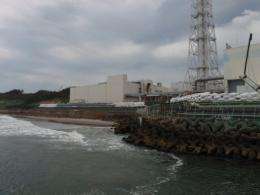Fukushima radiation 'mostly fell in sea': study

Most of the radioactive fallout from the disaster at the Fukushima nuclear plant dropped into the ocean and began circling the planet, Japanese researchers said Thursday.
Up to 80 percent of the caesium released by the Fukushima Daiichi power plant landed in the Pacific and made its way into other oceans around the world, scientists at the Meteorological Research Institute said.
"The rest has fallen on land" in and around Fukushima, said Hiroshi Takahashi, a researcher at the institute in Ibaraki, northeast of Tokyo.
"The results mean the ocean was more contaminated than land, although recent data have shown that ocean pollution resulting from the accident was well below levels affecting humans," Takahashi said.
Researchers say the radioactive materials, including caesium-137, an isotope with a half-life of more than 30 years, were widely dispersed when they entered the oceans and each particle would measure less than one micrometer -- one seventh the size of a human red blood cell.
Using computer simulations, they calculate the material was first blown northeast over eastern Russia and Alaska, before falling into the Pacific and reaching the western coast of the mainland United States around March 17, Takahashi said.
The materials were believed to have completed their first around-the-globe trip by March 24, he said, adding that the results would be presented to an academic meeting in Nagoya, central Japan.
Several previous studies, including one produced in France last month, have concluded the fallout had been hugely diluted by ocean currents and, except for near-shore species, posed no discernible threat.
Japan has been on alert for the impact of radiation since an earthquake and resulting tsunami struck the northeast of the country on March 11, crippling the Fukushima Daiichi nuclear power plant.
Its cooling systems were knocked offline and reactors were sent into meltdown, resulting in the leaking of radiation into the air, oceans and food chain.
(c) 2011 AFP


















